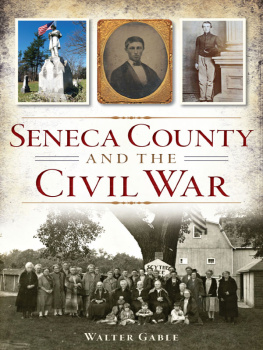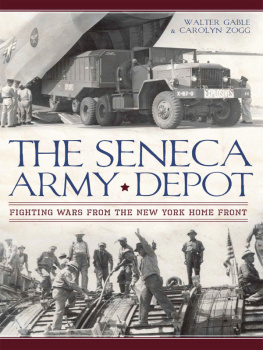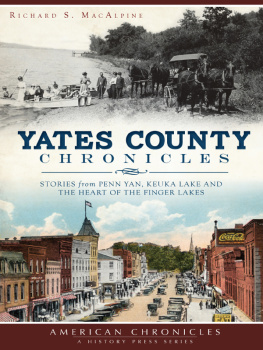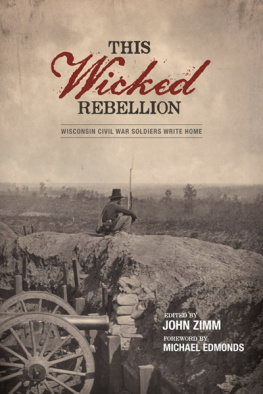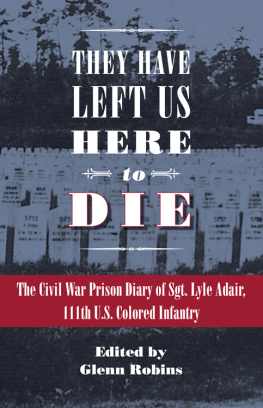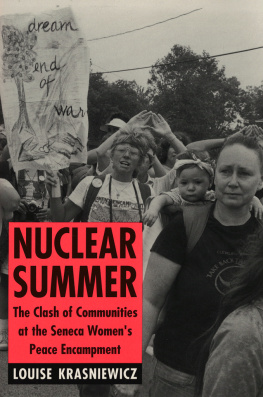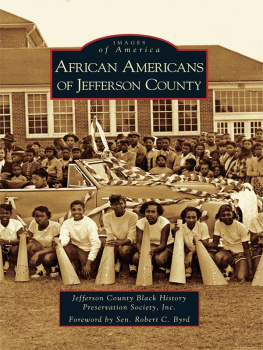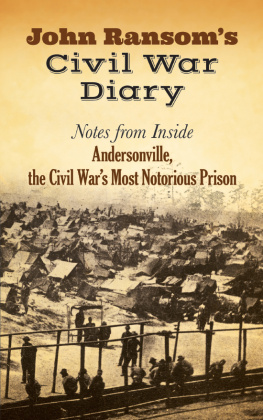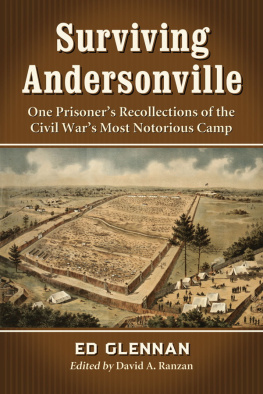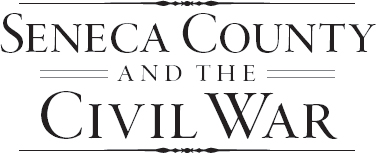
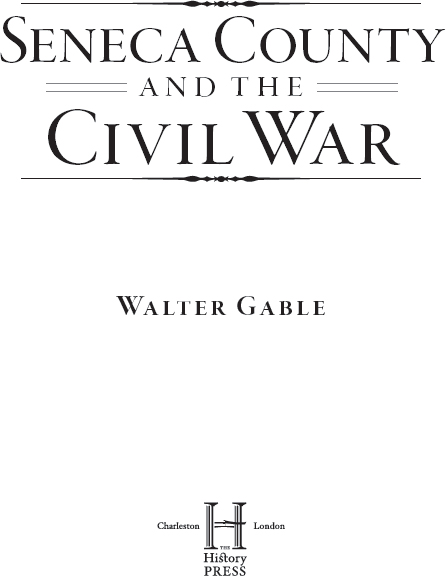
Published by The History Press
Charleston, SC 29403
www.historypress.net
Copyright 2014 by Walter Gable
All rights reserved
First published 2014
e-book edition 2014
ISBN 978.1.62585.161.1
Library of Congress Cataloging-in-Publication Data
Gable, Walter.
Seneca County and the Civil War / Walter Gable.
pages cm
Includes bibliographical references and index.
print edition ISBN 978-1-62619-633-9
1. Seneca County (N.Y.)--History, Military--19th century. 2. New York (State)--History--Civil War, 1861-1865. 3. Soldiers--New York (State)--Seneca County--History--19th century. 4. New York (State)--History--Civil War, 1861-1865--Regimental histories. 5. Seneca County (N.Y.)--Biography. I. Title.
F127.S4G33 2014
974.76903--dc23
2014022047
Notice: The information in this book is true and complete to the best of our knowledge. It is offered without guarantee on the part of the author or The History Press. The author and The History Press disclaim all liability in connection with the use of this book.
All rights reserved. No part of this book may be reproduced or transmitted in any form whatsoever without prior written permission from the publisher except in the case of brief quotations embodied in critical articles and reviews.
This book is dedicated to the memory of my great-grandfather John Loudebank Hoster.

John Loudebank Hoster
(July 15, 1842October 30, 1930).
CONTENTS
ACKNOWLEDGEMENTS
Many people have greatly assisted me in making this book happen. Two of these are Carolyn Zogg and Naomi Brewer, fellow local historians who have become my close friends. They have been extremely helpful with proofreading draft chapters and preparing the books index. Everyone should have two friends as dear as these two.
Bruce Lyon, my current office volunteer, deserves special mention. His assistance has made it possible for me to devote quality time to actual writing.
William Sebring, historian for the town of Romulus and hardworking member of the Sons of the American Revolution and the Sons of Union Veterans, has been a faithful mentor for this book.
Whitney Tarella Landis, commissioning editor for The History Press, has been just wonderful. Her guidance and support have been greatly appreciated.
The late Betty Auten, a former Seneca County Historian, spent the last several decades of her life gathering information on various soldiers from Seneca County, New York, who served in the Civil War. Her materials have been a wonderful information base for this book.
The Seneca County Board of Supervisors and several members of the county staff have been instrumental in making my work as the Seneca County Historian possible and so enjoyable. Their support is greatly appreciated.
The late Ethel M. Buckley, my high school history teacher, instilled in me a great love of history. At least one of her local history anecdotes is the basis of one of the chapters in this book.
Roberta Halden, as the historian for the former village of Seneca Falls, spent years compiling year-by-year notebooks of newspaper articles from various Seneca Falls newspapers. These notebooks are at the Seneca Falls Library and have been of tremendous help in the research for this book.
I thank the late Dale Theetge; his wife, Diane; and Jim Hughes for their help in providing one of my first major tasks as Seneca County Historian in early September 2003lining up individuals to be interviewed by a freelance writer preparing a program on the Scythe Tree for the public radio station in Rochester. I also thank Wayne Mahood for his expertise in helping with the content for my first article on the story of the Scythe Tree.
INTRODUCTION
As the Seneca County Historian for the past ten years, I have continued to be amazed at how much history Seneca County has, especially given that U.S. census data for 2010 lists the countys population as 35,253. It is in Seneca County that we have the birth of the womens rights movement in 1848, the organization of the Latter Day Saints Church in 1830 and the worlds largest herd of all-white white-tailed deer. Those events are not the subject of this book. The first part of this book tells about the many companies in which Seneca County men volunteered to serve and the interesting stories of several of these soldiers. One of these stories tells about William Cross and five of his sons who all served in the War. Three Seneca County men received the Medal of Honor. One chapter uses as much as possible the actual wording of John Loudebank Hoster, my great-grandfather, from daily journal entries for his entire wartime service, including his time as a prisoner at Andersonville, Georgia, and Florence, South Carolina. In April 2013, my brother Wayne and I visited the Andersonville and Florence sites to get a better grasp of how horribly traumatic his prison camp experiences must have been. Hosters detailed information has been extensively used by historical scholars.
The second part of the book tells about what was happening in Seneca County during the war years. Farmers enjoyed some of their greatest prosperity as wheat prices soared. Following the war, many of these farmers built grand new homes with their wartime profits. Industries such as the Seneca Knitting Mill were expanding their productive capacity to keep up with the militarys demand for socks and long underwear. In the latter years of the war, the county and town governments continued to raise their bounties to get men to enlist to fill recruitment quotas.

Seneca County is located in the heart of the Finger Lakes region. Michael Karpovage of Karpovage Creative Inc.

Logo developed for Waterloos 1966 centennial celebration of Memorial Day. Waterloo Historical Society.
The third part of the book describes how Seneca County residents have continued to preserve the legacy of the many county men who served in the Civil War. Waterloo is recognized as the official birthplace of Memorial Day because of events that took place in that community in 1865 and 1866. The Scythe Tree story began with James Wyman Johnson, who hung his scythe in a tree near the kitchen door and went off to serve in the war. There are five major Civil War monuments or memorials in the county, each with its own unique qualities. Many Civil War veterans joined one of the local Grand Army of the Republic (GAR) posts. As the Union veterans dwindled in numbers, these GAR posts were replaced by the Sons of Union Veterans and the Daughters of Union Veterans of the Civil War.
The year 2014 is a most appropriate year for the publication of this book because it marks the 100th anniversary of one event and the 150th anniversary of another. 2014 is the 100th anniversary of the chartering of the Caywood Camp, Sons of Union Veterans (SUV). Located in Ovid, the Caywood Camp is the only SUV camp in Seneca County. The Sons of Union Veterans is a fraternal organization dedicated to preserving the history and legacy of heroes who fought and worked to save the Union. It was 150 years ago that John L. Hoster was captured and spent four months in the Andersonville prison. Meanwhile, many soldiers were killed or wounded in the battles of the final year of the Civil War.
Next page
